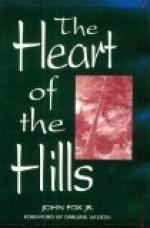field. On top of a hill he stopped for a moment
panting and turned to listen. There were no sounds
of pursuit, the roar of the train had started again,
and he saw the lights of it twinkling on toward the
capital. He knew they would have bloodhounds on
his trail as soon as possible; that every railway-station
agent would have a description of him and be on the
lookout for him within a few hours; and that his mother’s
house would be closely watched that night: so,
gathering his breath, he started in the long, steady
stride of his foot-ball training across the fields
and, a fugitive from justice, fled for the hills.
The night was crisp, the moon was not risen, and the
frozen earth was slippery, but he did not dare to
take to the turnpike until he saw the lights of farm-houses
begin to disappear, and then he climbed the fence into
the road and sped swiftly on. Now and then he
would have to leap out of the road again and crouch
close behind the fence when he heard the rattle of
some coming vehicle, but nothing overtook him, and
when at last he had the dark silent fields and the
white line of the turnpike all to himself he slowed
into a swift walk. Before midnight he saw the
lights of his college town ahead of him and again
he took to the fields to circle about it and strike
the road again on the other side where it led on toward
the mountains. But always his eyes were turned
leftward toward those town lights that he was leaving
perhaps forever and on beyond them to his mother’s
home. He could see her still seated before the
fire and staring into it, newly worn and aged, and
tearless; and he knew Mavis lay sleepless and racked
with fear in her little room. By this time they
all must have heard, and he wondered what John Burnham
was thinking, and Gray, and then with a stab at his
heart he thought of Marjorie. He wondered if
she had got his good-by note—the taking
back of his promise to her. Well, it was all over
now. The lights fell behind him, the moon rose,
and under it he saw again the white line of the road.
He was tired, but he put his weary feet on the frozen
surface and kept them moving steadily on. At
the first cock-crow, he passed the house where he had
stayed all night when he first rode to the Bluegrass
on his old mare. A little later lights began
once more to twinkle from awakening farm-houses.
The moon paled and a whiter light began to steal over
the icy fields. Here was the place where he and
the old mare had seen for the first time a railroad
train. Hunger began to gnaw within him when he
saw the smoke rising from a negro cabin down a little
lane, and he left the road and moved toward it.
At the bars which let into a little barnyard an old
negro was milking a cow, and when, at the boy’s
low cry of “Hello!” he rose to his feet,
a ruse carne to Jason quickly.
“Seen any chestnut hoss comin’ along here?”
The old man shook his head.
“I jist got up, son.”
“Well, he got away from me an’ I reckon he’s gone back toward home. I started before breakfast—can I get a bite here?”




